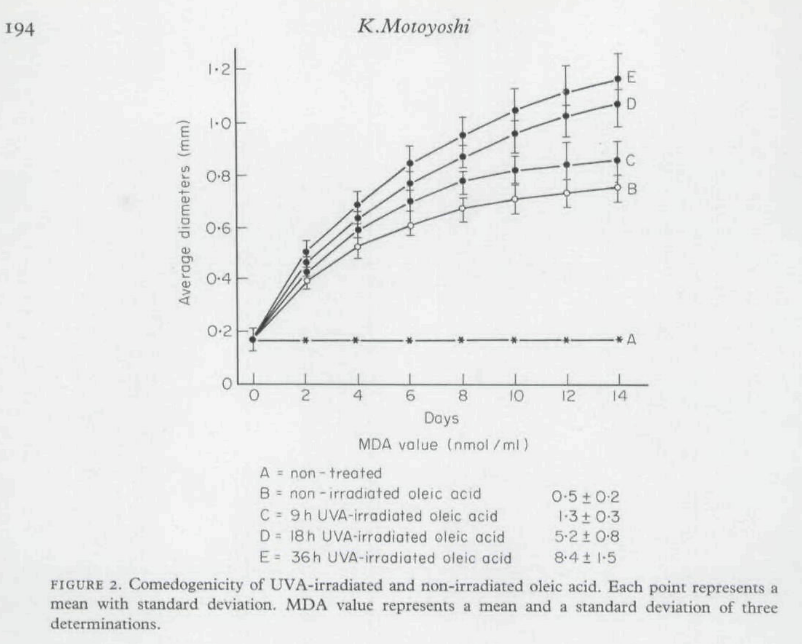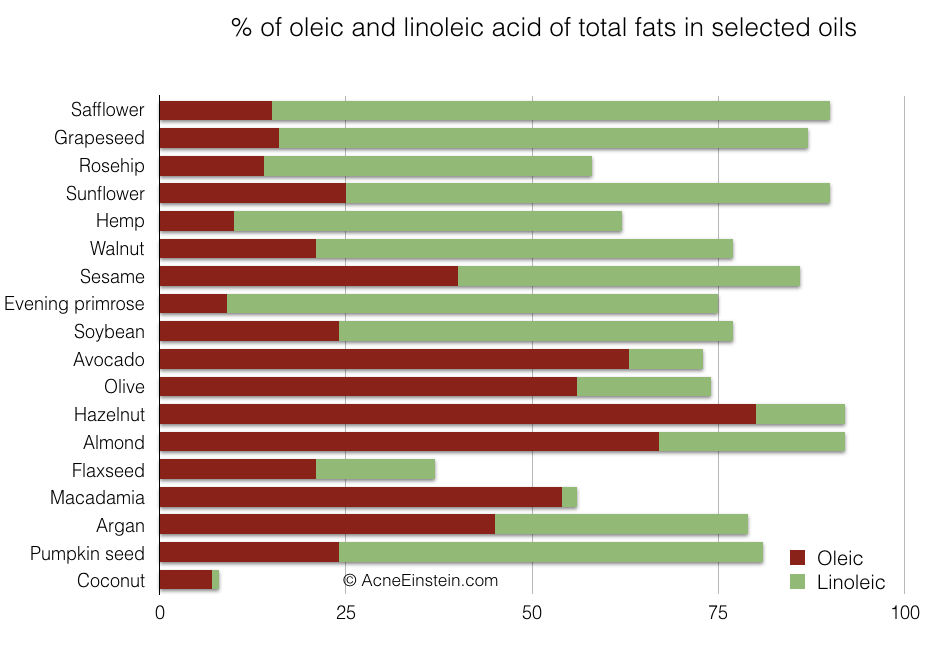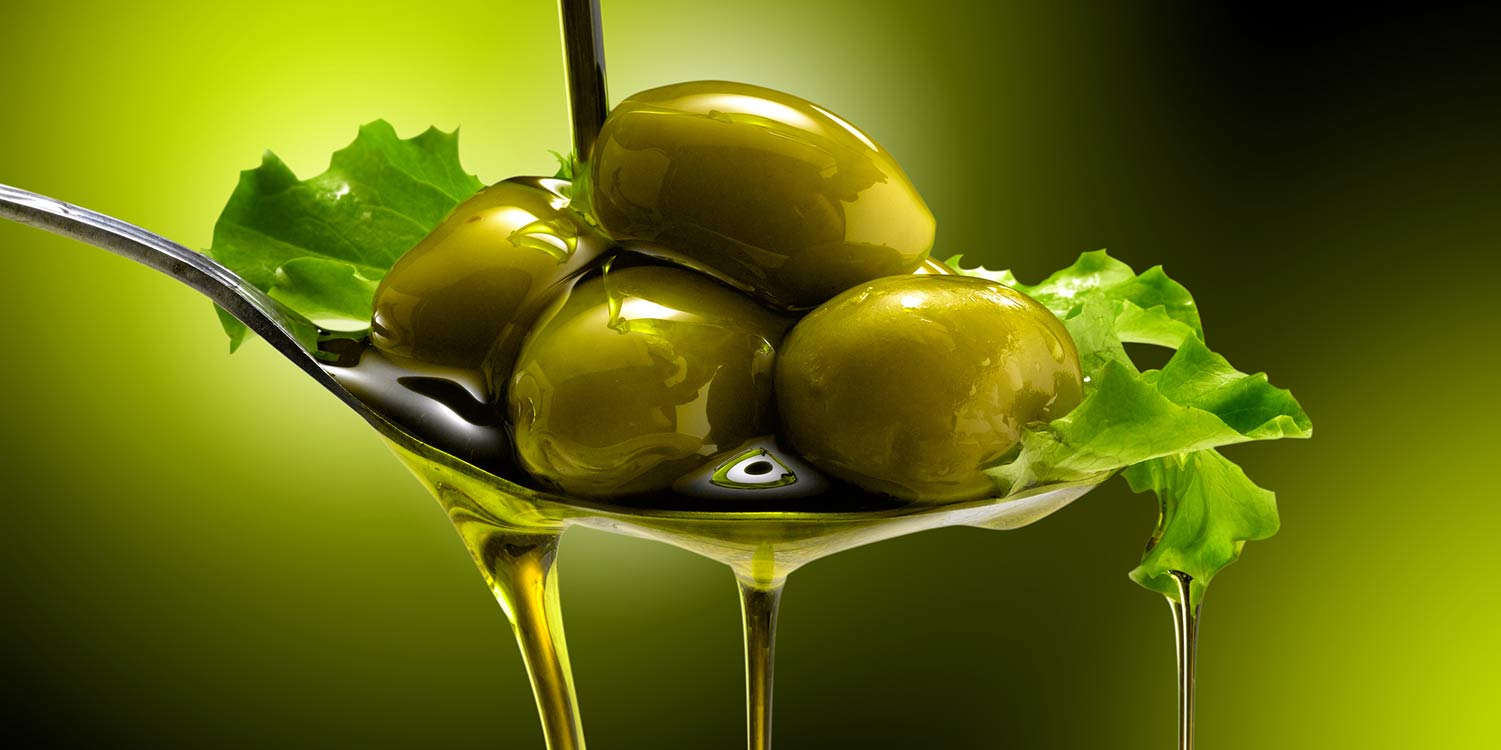We live in a world where millions of men and women are desperately seeking new ways to protect and nourish their skin. Lotions and potions line bathroom cabinets across the globe, and there’s a distinct trend for organic products that draw from the earth’s natural bounty to deliver supposedly impressive results.
Olive oil is one of the so-called miracle products which is endorsed and recommended by natural health and beauty sites all over the web. Those worried about their skin are urged to slather this oil all over their face and reap the benefits of this wonderful substance. Olive oil is said to moisturize without blocking the pores, as well as exfoliating and improving the skin’s natural elasticity. What more could you ask for in a skincare solution?
Thousands of people have applied olive oil to their faces on the recommendations of these health and beauty ‘experts’ – but a closer look at the scientific evidence shows that putting olive oil on your skin is a really, really bad idea. Here are three reasons why you absolutely should not use olive oil on your skin.
Olive oil can cause acne when used topically
To date, there haven’t actually been any studies on whether olive oil directly causes acne in humans – but in animal studies, applying oleic acid (the main fatty acid in olive oil) has been shown to cause acne, rather than offering any skincare benefits.
One study published in the British Journal of Dermatology actually used oleic acid to induce acne in rabbit ears, so that they could study various anti-acne drugs. The study discovered that oleic acid and its peroxides were able to induce large comedones (the skin-colour bumps and papules that will be familiar to those who have experienced acne in their lives). The more oleic acid was applied, the larger the comedones grew.
This graph shows the average size of the biopsied comedones over time. The line B represents pure, undamaged oleic acid – the kind found in olive oil.

Source: Motoyoshi, K. Enhanced comedo formation in rabbit ear skin by squalene and oleic acid peroxides. Br. J. Dermatol.109, 191–8 (1983). https://www.ncbi.nlm.nih.gov/pubmed/6223652
Oleic acid vs. olive oil
Though it should be stated that olive oil itself was not used in this particular study, the fact that oleic acid is the main fatty acid in olive oil still renders the results significant. Fatty acids like oleic oil are bound to triglycerides, which are usually too large to penetrate the skin – but olive oil (and many other oils recommended for skincare purposes) also contains some amount of free fatty acids.
Also, the bacteria in the skin produce enzymes that break triglycerides into their constituent fatty acids. The combination of free fatty acids in the oil and those released by bacteria provides a steady supply of oleic acid to the skin.
Put simply: one of the key substances found in olive oil has been proven to cause acne, and was used to induce comedones in rabbits.
Olive oil feeds acne-causing bacteria on the skin
One of the main reasons why oleic acid (and by proxy, olive oil) causes acne, is that it feeds the acne-causing bacteria on the skin’s surface. We’ve already established that certain bacteria on the skin (known as P. Acnes lipases) can break down triglycerides into free fatty acids, so that the skin can absorb them. A significant study from 1993 also discovered that the addition of oleic acid boosts the growth of P. Acnes by between 50% and 100% – depending on how much oleic acid was present in the petri dish.
The authors of the study also concluded that oleic acid helped the bacteria to anchor itself into the wall of the skin follicle, making it even harder to remove. This is called ‘colonizing’, and it’s a key factor in the ongoing presence of acne.
Olive oil disrupts the protective skin barrier and leaves the skin exposed to breakouts
There’s also strong evidence to suggest that olive oil, as well as causing acne and increasing the presence of bacteria, can disrupt your skin’s natural protective barrier and leave the skin exposed to further irritation. So much for this miraculous natural remedy!
One study, which examined the impact of topical oils on the skin barrier, discovered that olive oil slowed down the healing of the skin. The research was carried out on mice, which have almost identical skin barriers as humans, and the results showed that olive oil (as well as mustard and soybean oils) ‘significantly delayed recovery of barrier function compared with untreated skin’.
Another study took place in 2013, which involved a team of researchers asking adult volunteers to apply six drops of olive oil to their forearms twice a day for five weeks. When the five weeks was over, the results showed a weakening of the skin barrier function and mild skin irritation.
The team concluded that ‘topical treatment with olive oil significantly damages the skin barrier, and therefore has the potential to promote the development of, and exacerbate existing, atopic dermatitis’. The researchers also stated that their findings challenge ‘the unfounded belief that all natural oils are beneficial for the skin’.
What oils should be used instead?
To be honest, I’m not a fan of putting oil on the skin. But for those that are drawn to it, fortunately, there are some natural oils out there which can benefit the skin and won’t cause acne or disrupt the skin’s barrier function. Researchers in Germany tested a range of different vegetable oils, including sunflowers, hemp, grapeseed, sesame, almond, flaxseed, argan and pumpkin seed oil, and discovered that oils with less oleic acid and lots of linoleic acid are the most suitable for skincare purposes.
This graph shows the proportion of oleic and linoleic acids of total fats in selected oils. If you want to use oils on your skin, go for something where the green bar is long and the red bar is short.

Best skincare oils to try
Conclusion
Olive oil is certainly one of nature’s great creations, and it makes for a fantastic salad dressing. Unfortunately, the presence of such high levels of oleic acid make it a horrible choice for skincare, and it should be avoided at all costs.


Does it make a difference in the type of olive oil? For example: organic extra virgin olive oil? I ask because same applies with coconut. When I use coconut oil, no… Not for me. When I use extra virgin cocount oil, no breakout.
No, all forms of olive oil are high in oleic acid, which is the problematic part.
Cetaphil moisturising lotion includes macadamia nut oil which on your chart is high in oleic acid. Should this be a concern?
Depends on the concentration. I doubt it’s an issue for most people. As mentioned in the article, the vast majority of the fatty acids in oil are bound and thus have little effect on the skin.
What about consumption of oleic acid/olive oil? Is there anything to be said about that?
Eating olive oil, and oleic acid, is fine.
I’ve used pure safflower for years and swear by it! It just feels so right and very calming when it goes on, becomes one with my skin, and never breaks me out. Plus it’s really cheap. I don’t know why more products don’t contain it.
I just ordered a facial cleanser in the mail and the ingredients are below:
[Water, Saponified Coconut, Hemp & Olive Oils with retained Glyceine, Organic Shea Butter (butyrospermum Parkii), Vitamin E oil (tocopheryl acetate), Tea Tree Oil, Sea Salt, Citric Acid, Rosemary (rosmarinus officinalis) extract.]
Guess it would be best not to use it?
It depends on how much olive oil there is in the product, but I don’t think olive oil in skincare products is a huge issue. It’s used in so many products that were it a huge problem, I think more people would know about it. Also, as I mentioned in the article, it’s the free fatty acids that are the problem. Fatty acids bound in triglycerides are too big to penetrate the skin and likely have no effect. If the product doesn’t have free oleic acid, it’s probably ok.
That’s complete bullshit. Olive oil has been used for thousands of years topically, face and body. It’s non comedogenic, nourishes and heals the skin with multiple anti-inflammatory properties. It’s great for hair and scalp as well. Sounds like your over-the-counter acne treatments and moisturizer companies have their own publishers going out of their way here. I’m all for scientific studies, but You don’t need to abuse animals to figure out what works for you regarding this subject more than any other horrible experimentation that animals have to endure. The animal subjects probably had outbreaks from fucking distress more than anything. Other than a few completely organic/non animal cruelty/vegan/spf moisturizers (mainly available online and at a hefty price), You’re much better off using most extra virgin olive oil brands than any moisturizer out there. Coconut oil is a good substitute as well.
When the data doesn’t agree with what you want to be true, get angry. Always a winning strategy!
Thumbs up to you mate, sadly this article turns up at the top of the search results. I will try virgin olive oil and post the results. What more harm could it do.
P.S. i have heard Almond oil is proven to help acne and dark circles. But the graph on the article shows the long red bar for almond too infact same as olive oil. So i guess this is just some marketing BS.
Lesson learned! I tried a bit of olive oil when I was washing off my makeup the other night as I heard of all the potential wonders of olive oil for acne. Big mistake! I’ve been battling break outs ever since for about 1 week now. It made my acne so much worse and prior to trying it my skin was fine, just a couple of my usual clogged pores here and there. Now I’m battling a rash like acne on my cheeks, upper forehead and even further clogged pores in the usual places. Can’t wait until this clears up. Never again will I experiment with oils on my face.
This really surprises me. I used to have terrible adult acne and by following your advice (diet, skincare, etc) I got rid of it and my skin is perfect now except for very tiny occasional blackheads (really rarely) and very small red pimples a day or two before my period (not every time). My skin is very sensitive and irritable so this is big progress. However, I used olive oil every night to remove my makeup and I’ve been doing this for at least two years during which time I’ve also been acne free. I use it as a body lotion, too, and my skin is super soft thanks to it. Why would that be? I’m beyond confused now
Glad to hear your skin is doing better. I don’t mean to imply that olive oil causes problems for everybody. Oils, in general, don’t penetrate the skin and thus have limited potential to help or harm. It’s just that the fatty acid profile in olive oil can be problematic for people with skin problems, and if one wants to use oil on the skin, then there are better options than olive oil. My guess is that in your case the oil just acts as an additional barrier that prevents moisture loss, and that helps to make your skin feel smooth and soft. You would probably get similar results also with other oils.
I have been using extra virgin coconut oil on my skin and my acne has improved. I was drying my skin out too much washing at night (even just with water). Coconut byproducts are in a lot of skin and hair products and don’t have a reputation of being comedogenic. I’m really wondering if your reasoning is off here.
I’m not sure how your anecdote about coconut oil is relevant in a post about olive oil. My reasoning and evidence is outlined in the studies cited. Feel free to tell me why they are wrong and cite other studies that show that.
Also, regardless of any ‘reputation’, coconut oil is comedogenic – as evidenced by many studies that have measured it. That being said, whether something is comedogenic or not is not a good indication that it causes acne.
I think the author advertising non oil products maybe he is into cleansers or beautu products business and it is going down because a lot of people convert ito natural oils. All he has to do is destroy reputation of natural products.
When facts don’t agree with your opinions – blame the Big Soap (or whatever). This is especially silly considering that I recommended alternative oils to olive oil for those who want to use oils. The point of this post is that putting olive oil on the skin isn’t a good idea – for reasons outlined in the cited studies, but other oils are perfectly ok.
So using a product that contains olive oil would be okay? Marie Veronique has a vitamin c+E+Ferulic serum that contains olive oil. As well as a treatment retinol serum containing olive oil. I am no chemist and can not decipher whether or not these would contain “free oelic acid” just by looking at the ingredients list in general. Would you be able to tell me whether or not I should skip these two products? They are expensive, but I prefer to avoid most products with strong preservatives and fragrance which I believe also disrupts my skins barrier. I’ll try to post ingredient lists
I can’t comment on specific products as I really have no insights into their formulations. But a little bit of olive oil in the formulation should be ok.
I believe you are right on! I wish I had read this 3 days ago! I went to my local health food store and bought various oils; oulive butter, sweet almond oil, avocado oil, grapeseed oil to name a few. Slathered it all over my face and neck, which was really in great shape already (just trying to save money). The next morning, every pore on my face was red and looked irritated. Now, for the last 48 hours, my skin has peeled and peeled and peeled. The pores are still enlarged and look awful. I think I’ll stick with my products that have always worked and just continue to shell out the bucks.
Sorry to hear that. If you are looking to save money and want to try oils, I would recommend rosehip seed or squalane oil. Both should be safe for acne-prone skin.
Oh! But nails love the oil mixture!
I have been using Olive Oil to remove my make up for years now, and have been battling acne for a couple years. I have changed around all my products except the Olive Oil, that has remained a staple. Until I looked up that it does mess with your moisture barrier and what not. I stopped using Olive Oil to remove my make up for about 2 weeks now and I’m already seeing a huge improvement on my acne and skin texture. I don’t know why I didn’t think of trying to remove the Olive Oil out of my routine before since I have tried probably hundreds of other skin care products with no improvement… looking back it was obviously the Olive Oil doing the damage.
Ah I think you may be on to something. I started using the Innisfree Real Olive cleansing oil as part of my K-beauty ritual in May and by June-July my previously perfect jawline was covered in cystic acne. Not one or two but whole clusters of them. My derm thinks it’s because of the plan b emergency contraceptive I took around that time but I’ve taken it before with no such side effects. She just did a salicylic acid peel with comedone extraction and said some of them were extremely deep like oil rigs.
The research on how oil affects barrier recovery also shows that mustard and soybean oil, used separately, delay barrier recovery but sunflower seed oil accelerates recovery. Soybean oil has a decent amount of linoleic acid with a similar linoleic to oleic acid ratio to sunflower seed oil so it’s a mystery why it does not heal skin barrier. Not all oils with high linoleic-oleic ratio work. I wonder if you know why.
Hard to say. Studies often come up with somewhat conflicting results and it’s not uncommon for one or two studies to show different results. It could also be that those oils have other substances that irritate the skin.
I started using olive oil to remove my make up a few months ago. However, after only 1 month use my skin began to breakout. I had a rash all over my forehead and my cheeks, chin, and nose developed papules and cystic acne. I’ve never struggled with acne before. I stopped using olive oil immediately. My acne has subsided, but I still have the rash on my forehead and frequent whiteheads. What can I do to regain balance to my skin? Should I just wait this out or are there additional measures that I can take to accelerate the healing process?